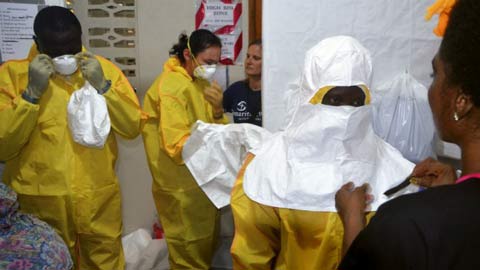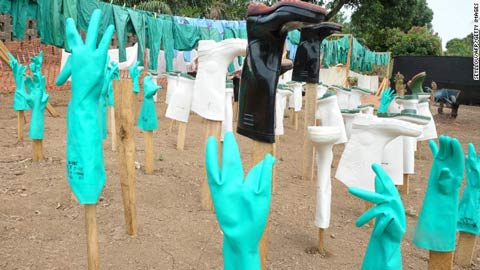Ebola is a severe, highly contagious viral disease with a death rate of up to 90%, killing 9 out of 10 patients. The Ebola epidermic today raging across the West African nations of Guinea, northern Liberia, and eastern Sierra Leone is being described as the worst in history. Since reports of the first confirmed case of Ebola in March of this year (in Guinea), the merciless tropical virus has claimed more than 670 lives.

Members of Samaritan Purse in Liberia. Photo: Zoom Doso, AFP
USA’s Centers for Disease Control and Prevention (CDC) reports 786 laboratory confirmed cases. The number of infected persons is however suspected to be much higher (1,201 or more) due to unreported cases. According to the World Health Organization (WHO), Ebola is so far responsible for 319 deaths in Guinea, 224 in Sierra Leone and 129 in Liberia.
Last week, the death of a Liberian official after flying into Lagos, Nigeria raised concerns about the possibility of the virus spreading across the region and to other parts of the world.
September 20 update: United Nations reports show the number of patients with Ebola in Guinea, Liberia and Sierra Leone has surpassed 6500, and the death toll is at more than 3000 deaths.
To better understand the Ebola virus, here’s information we gathered from the WHO website:
– The Ebola illness affects humans and nonhuman primates such as monkeys, gorillas, and chimpanzees. Ebola first appeared in 1976 in two simultaneous outbreaks, one in a village near the Ebola River in the Democratic Republic of Congo, and the other in a remote area of Sudan. The origin of the virus is unknown but fruit bats are considered the likely host of the Ebola virus.
– Infection occurs through direct contact (through broken skin or mucous membranes) with the blood, or other bodily fluids or secretions (stool, urine, saliva, semen) of infected people, or contact with environments that have become contaminated with an Ebola patient’s infectious fluids such as soiled clothing, bed linen, or used needles.
– Typical signs and symptoms of Ebola include sudden onset of fever, intense weakness, muscle pain, headache and sore throat; followed by vomiting, diarrhea, rash, impaired kidney and liver function, and in some cases, both internal and external bleeding.
– The incubation period, or the time interval from infection to onset of symptoms, is between 2 to 21 days. Patients become contagious once they begin to show symptoms. They are not contagious during the incubation period. Ebola virus disease infections can only be confirmed through laboratory testing.
– There is currently no specific treatment to cure the disease. Patients are dehydrated and need intravenous fluids or oral rehydration with solutions that contain electrolytes. Severely ill patients require intensive supportive care.

Gloves and boots used by medical personnel dry in the sun April 1 outside a center for Ebola victims in Gueckedou. Source: CNN
History has taught us that epidemics should not be ignored – cholera, polio, influenza, etc … and now Ebola? Because of the close proximity of African nations, limited healthcare resources and the deadly nature of this virus, it is imperative that immediate action be taken to curb its spread.
How then can we get involved in stemming this outbreak?
1. Healthcare workers – be especially careful
Most at risk of infection are health workers. Doctors, nurses, laboratory technicians and other healthcare workers are advised to be extremely cautious. Tasked with caring for Ebola patients, many of these honorable men and women are losing their lives primarily due to the highly contagious nature of the virus.
WHO: Healthcare workers are advised to use personal protection equipment such as individual gowns, gloves, masks and goggles or face shields when caring for patients. They should not reuse protective equipment or clothing unless they have been properly disinfected. Invasive procedures that can expose medical doctors, nurses and others to infection should be carried out under strict, safe conditions. Infected patients should be kept separate from other patients and healthy people, as much as possible.
2. Seek professional help Immediately
It is most common in the African culture for family members to become caregivers when loved ones fall sick. This may be a major reason why Ebola is likely to spread as these caregivers are not trained medical professionals. Do not revert to home treatment. Sick family members should be encouraged to seek immediate medical help. It is advised that infected persons be quarantined.
WHO: People are infectious as long as their blood and secretions contain the virus. For this reason, infected patients receive close monitoring from medical professionals and receive laboratory tests to ensure the virus is no longer circulating in their systems before they return home. Men who have recovered from the illness can still spread the virus to their partners through their semen for up to 7 weeks after recovery. For this reason, it is important for men to avoid sexual intercourse for at least 7 weeks after recovery or to wear condoms if having sexual intercourse during 7 weeks after recovery.
3. Remains to be handled differently
This may be hard to implement in communities where bodies of the dead are washed, dressed, tended by close family members and well wishers until final moments when they are buried, as is common in African communities. Sounding a clear warning that this can no longer continue is important in preventing the virus from ravishing local communities. Dead bodies are infectious.
WHO: Burial ceremonies in which mourners have direct contact with the body of the deceased person can also play a role in the transmission of Ebola. Persons who have died of Ebola must be handled using strong protective clothing and gloves, and be buried immediately.
4. Avoid bush meat
In a culture where meat is relished and a highly prized component of meals, this warning cannot be over emphasized. Experts advise that dead animals should be avoided and all meat properly cooked.
WHO: hunters in the rain forest who come into contact with dead animals found lying in the forest are at risk. It is important to reduce contact with high-risk animals including not picking up dead animals found lying in the forest or handling their raw meat. In Africa, infection has occurred through the handling of infected chimpanzees, gorillas, fruit bats, monkeys, forest antelope and porcupines found ill or dead or in the rain-forest.
5. A Community endeavor
African communities tend to be close knit. Misinformation, fear, false rumors and destructive beliefs which can spread like wild-fire may expedite the spread of contagious diseases. Sensitization of locals is hence a key factor in eradicating Ebola. The active participation of community leaders, village chiefs and organization heads is necessary in calming the rush of panic, and eliminating stigmatization and shame associated with Ebola deaths. Some local communities out of ignorance have branded Ebola as a curse, a result of witchcraft, or an abomination. Sharing valuable information and inviting members of the community to participate in stopping the advance of this killer in their midst can reverse such beliefs and trigger positive community action.
WHO: If you suspect someone close to you or in your community of having Ebola virus disease, encourage and support them in seeking appropriate medical treatment in a care facility. When visiting patients in the hospital or caring for someone at home, hand washing with soap and water is recommended after touching a patient, being in contact with their bodily fluids, or touching his/her surroundings.
6. Avoid travel to affected regions
Everybody is at risk … the rising numbers of infections are a clear indication that Ebola is not only a Guinea, Liberia, or Sierra Leone problem, it should be a major cause for concern to the world, now a global village.
It is imperative that governments of affected countries receive the support of the international community. Late Sunday evening, Liberia’s President Ellen Johnson Sirleaf announced closure of land borders in most of the Ebola-hit regions as the country fights to restrain the spread of Ebola: “All borders of Liberia will be closed with the exception of major entry points. At these entry points, preventive and testing centres will be established, and stringent preventive measures to be announced will be scrupulously adhered to.”
Country governments and local governing bodies are calling on all to join the fight against Ebola.
DUNIA readers are encouraged to reach out to family members and friends on the continent to share this information. Meanwhile, Liberia, Sierra Leone and Guinea remain in our prayers.
VIDEO
